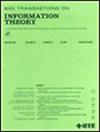自适应私有信息检索的通用编码框架
IF 2.9
3区 计算机科学
Q3 COMPUTER SCIENCE, INFORMATION SYSTEMS
引用次数: 0
摘要
T-串通私有信息检索(PIR)的问题使用户能够从具有N个服务器的分布式存储系统中检索M个文件中的一个,而不会向多达T个串通服务器的任何组透露有关所需文件索引的任何信息。在考虑的存储系统中,M个文件以X安全的k编码方式存储在N个分布式服务器上,这样任何多达X个串通服务器的组都无法了解文件;与文件的总大小相比,每个服务器上的存储开销减少了$\frac {1}{K}$;这些文件可以从任何$K+X$服务器重建。然而,在实际场景中,当用户从分布式系统检索所需文件时,一些服务器可能对用户的响应非常慢,或者根本不响应。这些服务器被称为离散服务器,特别是它们的身份和编号是事先未知的,并且可能随着时间的推移而变化。本文研究了一种能够容忍变数量掉队者存在的自适应PIR问题。通过引入可行的PIR编码框架的概念,提出了一种设计自适应PIR方案的通用编码方法。我们证明了在一个大小为q的有限域$\mathbb {F}_{q}$上,任何可行的PIR编码框架都可以用来构造一个自适应的PIR方案,该方案对同一有限域上所有数量的离散者$0\leq S\leq N-(K+X+T)$同时实现$1-\frac {K+X+T-1}{N-S}$的检索率。此外,我们提供了一个可行的PIR编码框架的实现,确保自适应PIR方案在任何有限域$\mathbb {F}_{q}$上运行,大小为$q\geq N+\max \{K, N-(K+X+T-1)\}$。本文章由计算机程序翻译,如有差异,请以英文原文为准。
A General Coding Framework for Adaptive Private Information Retrieval
The problem of T-colluding private information retrieval (PIR) enables the user to retrieve one out of M files from a distributed storage system with N servers without revealing anything about the index of the desired file to any group of up to T colluding servers. In the considered storage system, the M files are stored across the N distributed servers in an X-secure K-coded manner such that any group of up to X colluding servers learns nothing about the files; the storage overhead at each server is reduced by a factor of $\frac {1}{K}$ compared to the total size of the files; and the files can be reconstructed from any $K+X$ servers. However, in practical scenarios, when the user retrieves the desired file from the distributed system, some servers may respond to the user very slowly or not respond at all. These servers are referred to as stragglers, and particularly their identities and numbers are unknown in advance and may change over time. This paper considers the adaptive PIR problem that can be capable of tolerating the presence of a varying number of stragglers. We propose a general coding method for designing adaptive PIR schemes by introducing the concept of a feasible PIR coding framework. We demonstrate that any feasible PIR coding framework over a finite field $\mathbb {F}_{q}$ with size q can be used to construct an adaptive PIR scheme that achieves a retrieval rate of $1-\frac {K+X+T-1}{N-S}$ simultaneously for all numbers of stragglers $0\leq S\leq N-(K+X+T)$ over the same finite field. Additionally, we provide an implementation of the feasible PIR coding framework, ensuring that the adaptive PIR scheme operates over any finite field $\mathbb {F}_{q}$ with size $q\geq N+\max \{K, N-(K+X+T-1)\}$ .
求助全文
通过发布文献求助,成功后即可免费获取论文全文。
去求助
来源期刊

IEEE Transactions on Information Theory
工程技术-工程:电子与电气
CiteScore
5.70
自引率
20.00%
发文量
514
审稿时长
12 months
期刊介绍:
The IEEE Transactions on Information Theory is a journal that publishes theoretical and experimental papers concerned with the transmission, processing, and utilization of information. The boundaries of acceptable subject matter are intentionally not sharply delimited. Rather, it is hoped that as the focus of research activity changes, a flexible policy will permit this Transactions to follow suit. Current appropriate topics are best reflected by recent Tables of Contents; they are summarized in the titles of editorial areas that appear on the inside front cover.
 求助内容:
求助内容: 应助结果提醒方式:
应助结果提醒方式:


